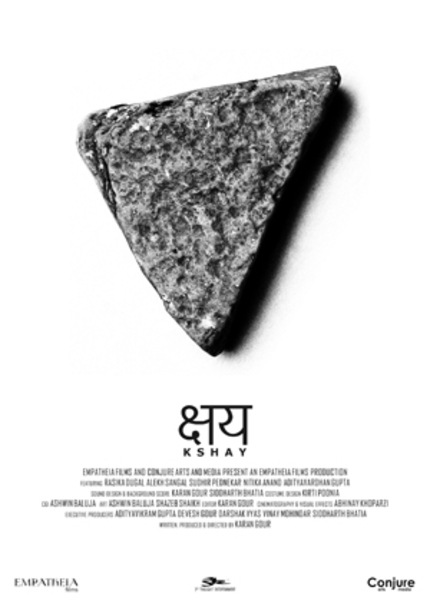SAIFF 2011: KSHAY (CORRODE) Review

Arvind is a construction foreman and his wife, Chhaya, is a homemaker. As the film opens, Chhaya is on an excursion with her husband who is visiting his boss to get some specifics for a new assignment. While Arvind is bickering with his manager, Chhaya wanders into a store selling sculptures of Hindu deities. They are all present, but one particular piece overpowers them all, a lifesize sculpture of Lakshmi dominates the shop and immediately draws Chhaya's attention. The statue is unfinished, it hasn't been coated with distemper, but it's raw beauty bores its way into Chhaya's soul, rendering her its slave. When the sculptor, a teenaged boy, tells her the price of 15,000 rupees, all she can think of is finding a way to obtain the money and the statue.
Chhaya's obsession grows exponentially each day as she becomes more and more convinced that Lakshmi is destined to be hers, despite the fact that the cost of the statue is roughly half a year's wages for Arvind. Little things happen each day that help to cement that conviction. When she's called upon to babysit for a neighbor, she learns that the child's mother was thought to be barren until she prayed to a picture of Lakshmi and fourteen months later she became pregnant. Chhaya was the victim of a miscarriage herself, and this revelation, after having been in Lakshmi's presence, drives her obsession ever further as she becomes convinced that Lakshmi's presence in her life will make everything good.
Meanwhile, as Chhaya spirals inward, the world around her and her relationship to it become more and more disengaged. Her relationships begin to crumble as she sees nothing but her goal, and she'll do anything to achieve it, including betraying the trust of those who care for her. Gour's film is very explicit about expressing Chhaya's mental state on film. She doesn't go completely mad all at once, but she does begin to melt down a little at a time, until she is ultimately a puddle of weakness, willing to sacrifice anything, even her own life, for this object.
Kshay is not a complex visual story, but its use of cinematography, special effects, and music are truly astounding and integral to the feel of the film. The contrasty black and white photography elicits a certain type of emotion from the viewer, causing him to question where Chhaya's reality ends and her fantasy begins. As the film moves on, this distinction gets easier to make, but it is still in question, as is her sanity all along. The score is absolutely stunning and does as much to convey emotion and the dissonance of Chhaya's reality as the script or photography.
Rasika Dugal as Chhaya is the rock of Kshay, She is in nearly every scene, committing completely to her character and Chhaya's erosion and mental destabilization. It would have been very simple to take a dive into melodrama with the character of Chhaya, but Dugal manages to control her emotional outlay in such a way that even though we see her very clearly deteriorating, we also understand how her husband might be less in tune with her. Her ability to underplay her growing madness is commendable, and I sincerely hope we see more of Rasika Dugal in the future. Her husband Arvind, played by Alekh Sangal, is equally convincing in his role as breadwinner. He manages to be caring without being doting, and to emit the aura of a man who wants the best for his wife, even agreeing to help her find a way to get this Lakshmi. Those two are the focus of the film and the only two really given any acting challenges, but they both succeed with flying colors.
Kshay is a wonderfully unsettling film. It explores obsession with the insight and care of a late-era Cronenberg or David Lynch. Karan Gour may not go to the extremes of those two filmmakers, but the feeling of obsession and compulsion is on a similar plane. In addition to being the director, Gour also scripted the film, composed the outstanding score, edited, mixed the sound, and produced Kshay. I've not seen many debut features as confidently done as Kshay, and I'm hoping it leads to big things for Karan Gour.
India is starting to make headway in the world of International art cinema. In the last few decades Mira Nair, Gurinder Chadha, and Deepa Mehta have made widely acclaimed films for the international market, but though their films may have an Indian cast and sensibility, they are largely shot and marketed in English for western audiences. The new guard, personified by filmmakers like Anurag Kashyap, Q, and others, are making Indian films for an international audience. All of those filmmakers with whom I've spoken have told me that success outside of India is the first step toward independent film being acceptable within India. I think that with Kshay, Karan Gour has made a step in the right direction.
Kshay screens on Friday, November 11th at 7pm at the NYIT Auditorium on Broadway

Do you feel this content is inappropriate or infringes upon your rights? Click here to report it, or see our DMCA policy.






